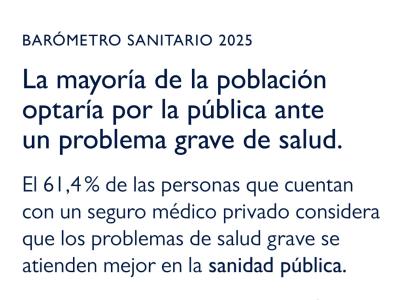In Madrid, the Ministry of Health has released the results of the second wave of the Health Barometer 2025, developed in collaboration with the Center for Sociological Research (CIS). This report reveals the public's perception of Spain's public health care system, based on 2,318 interviews conducted in July of this year.
One of the most notable findings is the trust in the public health system, even among those who have private health insurance. 61.4% of the latter believe they would receive better care in the event of serious problems through public health care, highlighting the quality and safety of the National Health System (SNS).
In general terms, 52.5% of the population views the Spanish health care system positively, a slight decrease from 53.9% recorded in the first wave of the year. The average satisfaction stands at 6.02 out of 10, reflecting a downward trend. Nevertheless, the breakdown by levels of care shows high satisfaction among users of public services.
In primary care, 78.5% of the patients seen provided positive evaluations, a decline from 82.4% in the previous year. Hospital care also experienced a slight decline, with 77.8% positive ratings. The emergency services maintained an approval rating of 73.5%, similar to last year. In mental health, 74.9% indicated care that met or exceeded their expectations.
The Health Barometer also highlights the progress in the use of digital tools. 35% of respondents accessed their electronic health record, an increase compared to 32.8% in 2024. The use of interoperable electronic prescriptions grew to 20.6%. Telephone consultations in primary care were carried out by 52.1% of users, with increasing satisfaction of 68.9%.
For the first time, the report collects data on diagnostic tests carried out for new diseases in the last year, including the waiting times. 19.2% underwent ultrasounds, 13.7% underwent CT scans, 12.1% underwent magnetic resonance imaging, and 4.3% underwent colonoscopies, the latter having the longest wait times, with an average of 158 days.
In rapid access, 56.7% of ultrasounds, 50.3% of CT scans, 46.7% of MRIs, and 34% of colonoscopies were performed within a month of their medical recommendation. These data will provide an initial reference for future accessibility evaluations.
In addition, 17.7% of the population required mental health care in the last year. In primary care, the waiting time to see the family doctor exceeds eight days, with 71.2% waiting more than one day due to lack of availability.
This report provides a detailed view of the current state of public healthcare, and it is a valuable resource for future improvements in accessibility and quality of the services offered to citizens.
Fuente: Ministerio de Sanidad



